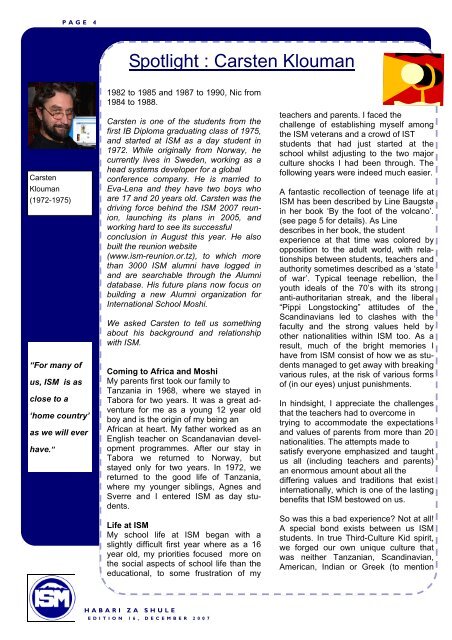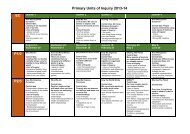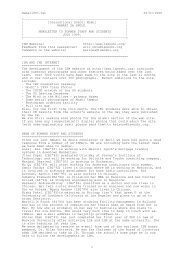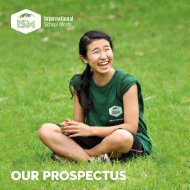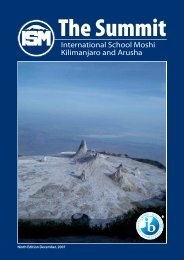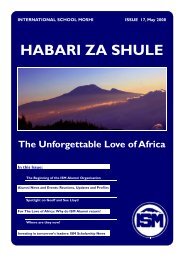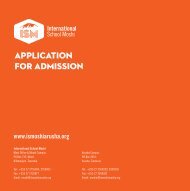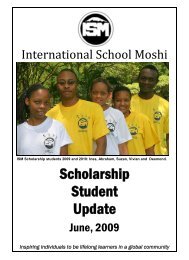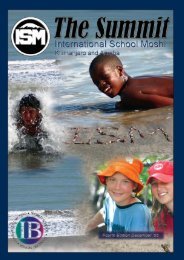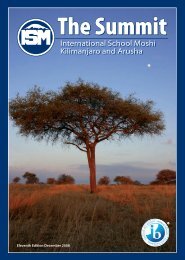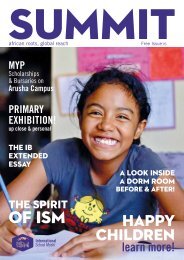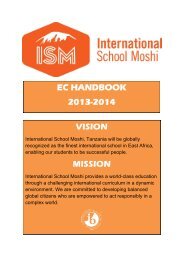HABARI ZA SHULE - International School Moshi
HABARI ZA SHULE - International School Moshi
HABARI ZA SHULE - International School Moshi
You also want an ePaper? Increase the reach of your titles
YUMPU automatically turns print PDFs into web optimized ePapers that Google loves.
PAGE 4<br />
Spotlight : Carsten Klouman<br />
Carsten<br />
Klouman<br />
(1972-1975)<br />
“For many of<br />
us, ISM is as<br />
close to a<br />
‘home country’<br />
as we will ever<br />
have.”<br />
1982 to 1985 and 1987 to 1990, Nic from<br />
1984 to 1988.<br />
Carsten is one of the students from the<br />
first IB Diploma graduating class of 1975,<br />
and started at ISM as a day student in<br />
1972. While originally from Norway, he<br />
currently lives in Sweden, working as a<br />
head systems developer for a global<br />
conference company. He is married to<br />
Eva-Lena and they have two boys who<br />
are 17 and 20 years old. Carsten was the<br />
driving force behind the ISM 2007 reunion,<br />
launching its plans in 2005, and<br />
working hard to see its successful<br />
conclusion in August this year. He also<br />
built the reunion website<br />
(www.ism-reunion.or.tz), to which more<br />
than 3000 ISM alumni have logged in<br />
and are searchable through the Alumni<br />
database. His future plans now focus on<br />
building a new Alumni organization for<br />
<strong>International</strong> <strong>School</strong> <strong>Moshi</strong>.<br />
We asked Carsten to tell us something<br />
about his background and relationship<br />
with ISM.<br />
Coming to Africa and <strong>Moshi</strong><br />
My parents first took our family to<br />
Tanzania in 1968, where we stayed in<br />
Tabora for two years. It was a great adventure<br />
for me as a young 12 year old<br />
boy and is the origin of my being an<br />
African at heart. My father worked as an<br />
English teacher on Scandanavian development<br />
programmes. After our stay in<br />
Tabora we returned to Norway, but<br />
stayed only for two years. In 1972, we<br />
returned to the good life of Tanzania,<br />
where my younger siblings, Agnes and<br />
Sverre and I entered ISM as day students.<br />
Life at ISM<br />
My school life at ISM began with a<br />
slightly difficult first year where as a 16<br />
year old, my priorities focused more on<br />
the social aspects of school life than the<br />
educational, to some frustration of my<br />
teachers and parents. I faced the<br />
challenge of establishing myself among<br />
the ISM veterans and a crowd of IST<br />
students that had just started at the<br />
school whilst adjusting to the two major<br />
culture shocks I had been through. The<br />
following years were indeed much easier.<br />
A fantastic recollection of teenage life at<br />
ISM has been described by Line Baugstø<br />
in her book ‘By the foot of the volcano’.<br />
(see page 5 for details). As Line<br />
describes in her book, the student<br />
experience at that time was colored by<br />
opposition to the adult world, with relationships<br />
between students, teachers and<br />
authority sometimes described as a ‘state<br />
of war’. Typical teenage rebellion, the<br />
youth ideals of the 70’s with its strong<br />
anti-authoritarian streak, and the liberal<br />
“Pippi Longstocking” attitudes of the<br />
Scandinavians led to clashes with the<br />
faculty and the strong values held by<br />
other nationalities within ISM too. As a<br />
result, much of the bright memories I<br />
have from ISM consist of how we as students<br />
managed to get away with breaking<br />
various rules, at the risk of various forms<br />
of (in our eyes) unjust punishments.<br />
In hindsight, I appreciate the challenges<br />
that the teachers had to overcome in<br />
trying to accommodate the expectations<br />
and values of parents from more than 20<br />
nationalities. The attempts made to<br />
satisfy everyone emphasized and taught<br />
us all (including teachers and parents)<br />
an enormous amount about all the<br />
differing values and traditions that exist<br />
internationally, which is one of the lasting<br />
benefits that ISM bestowed on us.<br />
So was this a bad experience Not at all!<br />
A special bond exists between us ISM<br />
students. In true Third-Culture Kid spirit,<br />
we forged our own unique culture that<br />
was neither Tanzanian, Scandinavian,<br />
American, Indian or Greek (to mention<br />
<strong>HABARI</strong> <strong>ZA</strong> <strong>SHULE</strong><br />
EDITION 16, DECEMBER 2007


